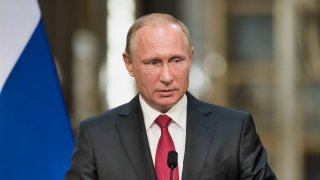Russia Is Losing Its Fear of Vladimir Putin
Thousands of Russians said goodbye to Vladimir Putin at Alexei Navalny’s funeral on March 1. They came to pay their respects to the courageous Russian democrat killed by Putin’s regime. But they also came to tell the Russian dictator it was time for him to go.
Thousands of Russians said goodbye to Vladimir Putin at Alexei Navalny’s funeral on March 1. They came to pay their respects to the courageous Russian democrat killed by Putin’s regime. But they also came to tell the Russian dictator it was time for him to go.
They did this for a simple reason: They were no longer afraid. They were not afraid of Putin or his henchmen, of his police or his courts. Like Navalny before them, these Russians had lost their fear, and a number of them told Western journalists exactly that.
Yes, they supported democratic change in Russia. Yes, they demanded that the war against Ukraine end and the boys be brought back home. And yes, they accused Putin of instituting fascism.
But none of that was as important as expressing their fearlessness.
Putin’s Biggest Mistake
Dictatorships can survive only as long as their subjects are afraid. Once a population sheds that paralyzing fear and people start to openly defy their leader, the system cannot survive for long. A regime can crack down with greater vigor, but the people have two weapons no dictator can match: numbers and symbols.
Several weeks before Navalny’s funeral, thousands of demonstrators in Russia’s Bashkortostan region took to the streets to protest the sentencing of activist Fail Alsynov. Navalny’s mourners and Alsynov’s supporters all know that regimes are powerless against multitudes of unarmed civilians. People power has felled tyrants the world over precisely because mowing down innocent men and women is no longer an option for the majority of today’s authoritarian regimes. These rulers claim to derive their authority from the people. Repression and incarceration are fine, but most contemporary dictators try to avoid mass murder.
If thousands came to Navalny’s funeral in Moscow, we can be sure that countless others in outlying regions have also stopped being afraid of the regime. Many more will shed their fear upon hearing about the thousands who demonstrated their support of Navalny. Putin should be very worried. No, Putin should be afraid.
Putin, a serial bumbler, made a mistake that may turn out to be even more damaging than his criminal invasions of Ukraine in 2014 and 2022. His mistake was to kill Navalny. Death made the opposition leader a symbol and a martyr, and a dictator can do nothing to outgun that.
Once Navalny died, Putin was trapped. Not permitting a funeral would have looked barbaric and anti-Christian, while allowing a funeral ran the risk of a political demonstration. Putin chose the latter because he probably believed people would be too intimidated by the police to express their opposition. He was wrong. Now Putin will be haunted by the ghost of Navalny and threatened by the diminished fear of his subjects.
What’s Next for Russia?
Navalny’s funeral has clearly shown that Putin’s bravado is unfounded. Some Russians adore him. But the number of Russians who would like him to be hanged is far greater than Putin and many Western analysts suspected. Consider that he barely survived former Wagner Group leader Yevgeny Prigozhin’s attempted coup in 2023. The war is costing thousands of Russian lives, and the civilian economy is shrinking. It is hard to avoid concluding that Putin is weak.
The Russian people and elites now have incontrovertible proof of that weakness. The incompetence and criminality of Putin and his regime are manifestly obvious. The timing of Navalny’s funeral could not be better, for this feckless mass murderer will be up for re-election in two weeks. Russians will have a wonderful opportunity to show their opposition by voting, staying in the streets, and telling Putin he should board the first plane to Pyongyang.
Not to worry if the people don't take advantage of this opportunity. Russia’s elites, who must be aghast at their supreme leader’s impotence, will not long be idle. Even now, they must be sharpening their knives, perhaps in anticipation of the Ides of March.
About the Author: Dr. Alexander Motyl
Dr. Alexander Motyl is a professor of political science at Rutgers-Newark. A specialist on Ukraine, Russia, and the USSR, and on nationalism, revolutions, empires, and theory, he is the author of 10 books of nonfiction, including Pidsumky imperii (2009); Puti imperii (2004); Imperial Ends: The Decay, Collapse, and Revival of Empires (2001); Revolutions, Nations, Empires: Conceptual Limits and Theoretical Possibilities (1999); Dilemmas of Independence: Ukraine after Totalitarianism (1993); and The Turn to the Right: The Ideological Origins and Development of Ukrainian Nationalism, 1919–1929 (1980); the editor of 15 volumes, including The Encyclopedia of Nationalism (2000) and The Holodomor Reader (2012); and a contributor of dozens of articles to academic and policy journals, newspaper op-ed pages, and magazines. He also has a weekly blog, “Ukraine’s Orange Blues.”


